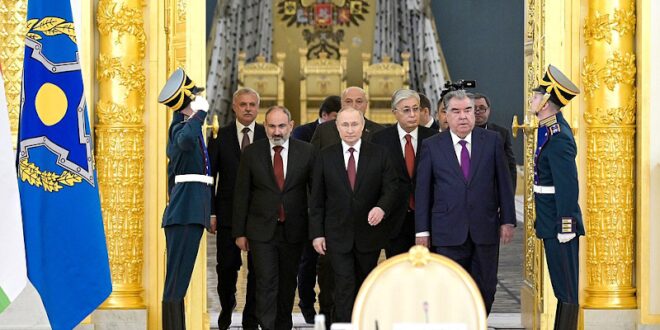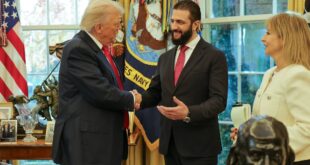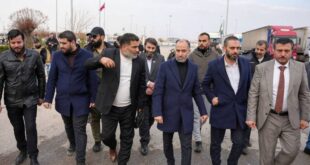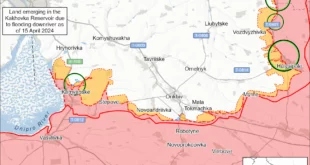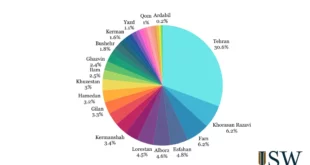The Novaya Gazeta Europe newspaper, in an article posted on its website on 24 April 2023, said: “The European Union has been working on plans for strengthening its ties with Brazil, Chile, Nigeria, and Kazakhstan, countries that are amicable with Russia, Politico reports. According to the media outlet, the EU’s goals are to isolate Russia, arm Ukraine, and contain China. According to the document, the EU is majorly interested in Kazakhstan due to the necessity of not letting Russia bypass international sanctions through the country. It is claimed that Kazakhstan itself would like to be a closer partner of the union”.
This shows how much importance the West attaches to the issue of withdrawing Central Asia’s largest country, sandwiched between Russia and China, from the influence of those two powers. Yes, it is true that the western community of nations has the potential to have a massive impact on the course of political processes in Astana, on the way the lives and social and economic conditions of people in Kazakhstan take shape. It is what it is. But one must point out that: the West’s ability to impact the situation in Kazakhstan is primarily economical in nature.
So the question is, is this advantage of the West capable of outweighing in the Kazakh elites’ minds the significance of Russia’s growing military and political influence and the Kremlin’s ‘king-making role’ in Kazakhstan?
To this the obvious answer is, likely not. Moreover, that the West is far away, Russia is close by and more similar politically. There’s a Kazakh saying: “A neighbor, beside whom one lives, is better than a relative who is far away”. The Kazakh behavioral stereotypes are based in many respects on the customs and folk wisdom of old Kazakhstan. The Kazakhs do not know what the Western countries are capable of in the event of conflict between the two sides. Because never before has there been that sort of thing in their own and their immediate ancestors’ life. But at the same time, they know very well from their own experience what Moscow could do to them in case of a similar conflict. The fact is that among the post-Soviet countries, Kazakhstan is long known to be the least disposed to stand up to Moscow. This seems to be even more the case now, i.e. after what happened in Kazakhstan in January 2022. Therefore, the statements like “Kazakhstan represents a potential EU toehold in one of those regions where Western allies are vying for influence (and resources) with Russia and China” unwittingly brings thoughts about how well the Western world is informed about the state of affairs in that Central Asian State.
Western political experts, engaged in assessing the decisions and actions by the Kazakhstan leadership, as well as the outlook for the situation in the Central Asian country and the political prospects for its ruling regime, usually base their judgments, as far as one can tell, on what has been said and written about it in the Russian and Kazakhstani Russian-language media.
While doing so, they are probably losing sight of the fact that the Kremlin is used to extending its control to Kazakhstan’s inner life by means of media pressure, taking advantage of the Russian television’s and the internet resources’ actually unchallenged dominance on the Kazakhstani information field. And the latter is no exaggeration. Here is what the influential Russian internet edition Lenta.ru told its readers in this regard: “Kazakhstan absolutely does not control more than half of the television network and almost the entire book market, not to mention the Internet. The information environment [in the Central Asian country] now is quite friendly to the authorities of Kazakhstan solely thanks to the support of Moscow, which protects the republican elites”.
Here, the expression ‘the information environment [in the Central Asian country] now is quite friendly to the authorities of Kazakhstan solely thanks to the support of Moscow’, in essence, means recognizing that the sphere of activity related to developing the media assessment of the decisions and actions by official Astana, as well as to forming its image and elaborating the notion about its prospects, is being controlled by Russians. In doing this business, they [Russians] are, as we can see from the above passage, displaying [greater] concern for protecting ‘the republican elites’.
But there’s no mistaking that they are primarily driven by the interests of Moscow in this case. There probably is no need in explaining, how the Kremlin’s propaganda and disinformation machine, that appears to be behind it all, works. In any case, it is quite clear that with this kind of practice continually implemented, much has been and is being left outside the field of view.
For instance, there have quite long been claims in the Kazakh-language segment of the Internet that ‘the Kazakh leadership is unhappy with Tasmagambetov’, ‘Russia seems to be ‘preparing’ a candidate for replacing the Kazakh President Kassym-Jomart Tokayev, this allegedly is Imangali Tasmagambetov’, and so on. The mainstream Russian-speaking media in Russia and Kazakhstan do not notice them or simply ignore them. The same is true for the Western political experts specializing in Kazakhstan.
Anyway, the Kremlin seems to be promoting Tasmagambetov as an alternative to Tokayev in the Central Asian country. The very setting of such a theme immediately gives rise to two questions: Why might Moscow feel the need for a change of priorities as to who it would prefer to see as its main partner in Astana; and why, then, should its alternate choice fall on Imangali Tasmagambetov? The answers to them are obvious.
Here are clarifications regarding the first one of those two questions. On the one hand, Kazakhstan has committed to complying with sanctions imposed against Russia over its unprovoked invasion of Ukraine. Yet on the other hand, the country, as they say in the press, ‘has become the most convenient hub to evade anti-Russian sanctions in 2022-2023’. In such a situation, Moscow and Astana have obviously made remarkable efforts to create the appearance of a strong divergence of views on the Ukrainian issue between them. It would have been beneficial for Moscow to keep the outer world caught up for as long as possible in the notion that Kazakhstan increasingly turns away from Russia, and Moscow, in retaliation for this, is conducting its own information campaign involving Russian deputies and propagandists, who are making provocative and aggressive statements about Kazakhstan. Yet to date, it’s not a secret for anyone that all that stuff is no more than illusion.
In its latest Kazakhstan Economic Update report, the World Bank said that “a principal concern for Kazakhstan is to avoid secondary sanctions which target countries that do extensive business with sanctioned entities”. The United States government has gone even further and, through its representative, Elizabeth Rosenberg (the assistant secretary for Terrorist Financing and Financial Crimes at the U.S. Treasury Department) warned that companies and banks in Kazakhstan could face sanctions if found to be aiding Russia to circumvent sanctions. The Kazakh media quoted her as saying that ‘the risk to Kazakh companies from secondary sanctions related to Russia was increasing’.
Proceeding from the above, it might be concluded that it seems that the time, when one could keep blowing smoke into the eyes of the rest of the world with talk about the alleged ‘conflict’ between Tokayev and Putin, ‘strict implementation of sanctions’, the ‘threat of a Russian attack on Kazakhstan’ and, accordingly, ‘forced support to Russia’, has been left behind. And now it seems to be necessary for the Kremlin to think over how to translate Astana from the category of ‘secret allies’ to the category of ‘open allies’, in other words, to manage to make it join Moscow and Minsk in their confrontation with the West, which is adopting an ever fiercer character. oAstana, which can no longer help Russia bypass sanctions and, at the same time, still is not sitting side by side with Moscow and Minsk in the anti-Western trenches, seemingly does not suit the Kremlin. Putin has probably always wanted the Central Asian country to serve in one kind of supportive role or another, leaving no other option for its leadership but to accept this state of things. Today’s Russia is hardly prepared to pay regard to independent Kazakhstan’s inalienable right to its sovereign choice. Now, after the latest events in and around Ukraine, by and large Putin hardly can offer the head of Kazakhstan anything other than stepping forward and standing shoulder-to-shoulder with him and Lukashenka in “their struggle against the ‘collective West’ for survival”. Tokayev would hardly agree to it. The presumable reason for this, that’s another matter. From there arises the need for a change of priorities as to who the Kremlin would prefer to see as its main partner in Astana.
Moscow also cannot but pay attention to growing disillusionment among the Kazakhstani public with the incumbent Kazakh president. Expectations of change remain unfulfilled. On that occasion, this author, in his article titled “Bis jetzt imitiert Tokajew nur seinen Vorgänger”, said the following: “The governing politicians in Kazakhstan have had a long tradition of using the Soviet practice of feeding the people with pretty, but non-working promises. In that sense, Tokayev seemingly just follows the path traced by Nazarbayev. His predecessor was in the habit to undertake innovative initiatives under ever louder titles and ever flashier slogan. At the beginning of 2022, the story kind of ended up with demonstrators repeatedly chanted slogans like ‘Shal, ket!’ (‘Old man, step down!’). As for Tokayev, he has not yet had time to build up quite a lot of non-working promises. But the perception is that in this, he follows in the footsteps of his predecessor”.
Here now are clarifications concerning the second one the two above mentioned questions. So why should the Kremlin’s alternate choice fall on Imangali Tasmagambetov? There seem to be two main factors in his favor in this regard. The first is that Imangali Tasmagambetov, as was reported by Reuters at the time, ‘has long been seen as one of a few potential succession candidates and is popular among the broader public, especially in the country’s oil-rich western regions’. That assessment of his role and place in Kazakh politics still remains broadly true. The second is that Imangali Tasmagambetov, along with Mr.Tokayev, are the only two top Kazakh politicians whom those in the Kremlin know really well.
 Eurasia Press & News
Eurasia Press & News
